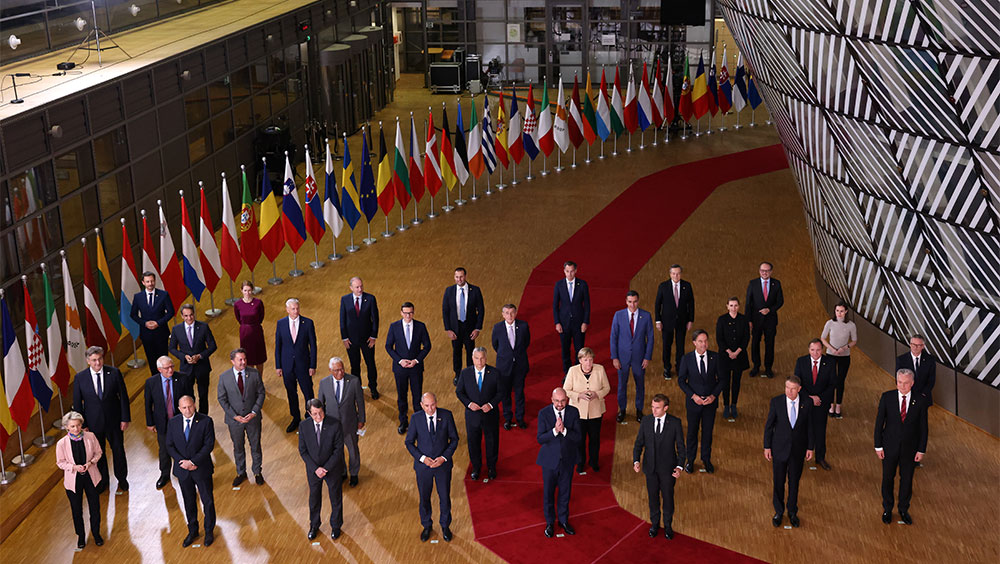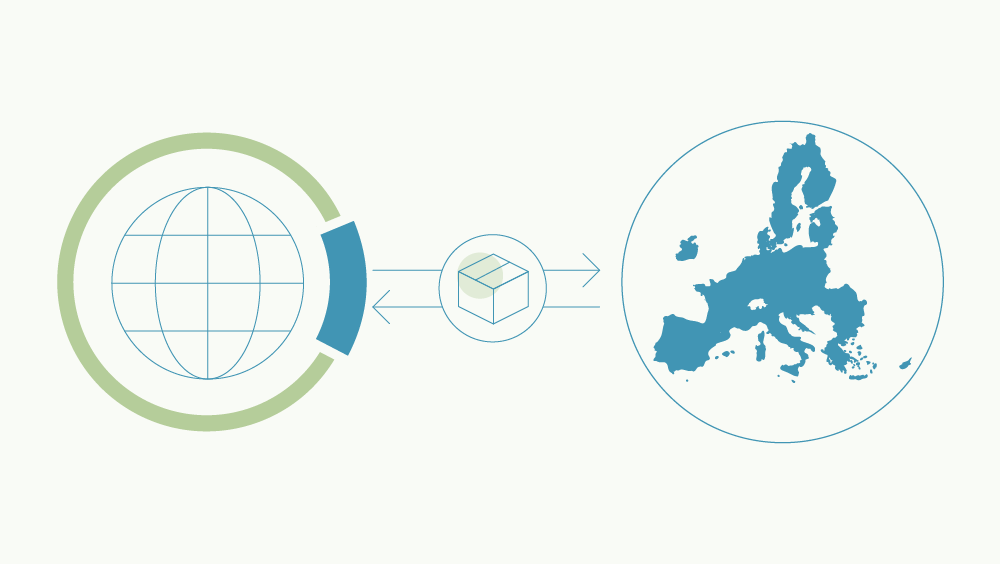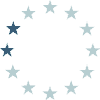
Main results
On 21 October, EU leaders met in Brussels to discuss COVID-19, energy prices, trade and external relations. They also held a debate on the rule of law. On 22 October, they talked about migration and the EU’s digital transition.
COVID-19
Vaccines
EU leaders noted that vaccination campaigns around Europe have brought about significant progress in the fight against COVID-19. Nevertheless, the situation in some member states remains very serious. Leaders called for efforts to overcome vaccine hesitancy to be stepped up, including by tackling disinformation, notably on social media.
- COVID-19 coronavirus pandemic: the EU's response (background information)
- Stronger together: the incredible journey of COVID-19 vaccines (visual story)
Travel
The European Council called for further coordination to facilitate free movement within the EU and travel into it. It encouraged the Commission to accelerate its work with third countries on the mutual recognition of certificates.
- COVID-19: travel within the EU (background information)
- COVID-19: travel into the EU (background information)
Preparedness for future health emergencies
To ensure better prevention of, preparedness for and response to future health emergencies in the EU, the European Council called for the conclusion of the negotiations on the Health Union legislative package and for member states’ involvement in the governance of the Health Emergency Preparedness and Response Authority (HERA).
International response
Leaders called for the rapid removal of obstacles hampering the global rollout of vaccines, and invited the Commission to further engage directly with manufacturers in this respect. This will allow member states to speed up the delivery of vaccines to countries most in need. The EU will continue to support the production and uptake of vaccines in partner countries.
Ahead of the G20 meeting and the special session of the World Health Assembly, the European Council underlined its support for a central role of the World Health Organization in future global health governance and for an international treaty on pandemics.
Remarks by President Michel on energy prices at the press conference following the summit
Energy prices
The European Council addressed the recent spike in energy prices and considered the impact of these price rises on citizens and businesses, especially those striving to recover from the COVID-19 pandemic. EU leaders noted that the toolbox presented by the Commission contained useful measures for both the short and the longer term.
The European Council invited the Commission to study the functioning of the gas and electricity markets, as well as the EU ETS market with the help of the European Securities Markets Authority (ESMA). Subsequently, the Commission will assess whether certain trading behaviours require further regulatory action.
EU leaders also invited the member states and the Commission to urgently make the best use of the toolbox to provide short-term relief to the most vulnerable consumers and companies, taking into account the diversity and specificity of the situations of the member states.
The Commission and the Council should also swiftly consider medium and long-term measures, which would:
- contribute to energy at a price that is affordable for households and companies
- increase the resilience of the EU’s energy system and the internal energy market
- provide security of supply and support the transition to climate neutrality, taking into account the diversity and specificity of the situations of the member states.
Finally, EU leaders called on the European Investment Bank to examine how to speed up investment in the energy transition.
The extraordinary meeting of the TTE Council (Energy) on 26 October 2021 will take this work forward immediately. The European Council will keep the situation under review and come back to it in December 2021.
Infographic - The EU’s role in global trade
 See full infographic
See full infographic
Trade
The European Council held a strategic discussion on EU trade policy.
External relations
The European Council discussed the preparations for the upcoming ASEM Summit on 25-26 November 2021, as well as for the Eastern Partnership Summit, which will be held on 15 December 2021. The European Council reiterated its call for the Belarusian authorities to release all political prisoners.
Ahead of the COP26 meeting in Glasgow, EU leaders called for an ambitious global response to climate change. It is essential to keep the 1.5°C global warming limit within reach. The European Council recalled the commitment by the EU and its member states to continue scaling up their climate financing, and called on other developed countries to urgently increase their contribution to the collective climate finance goal of USD 100 billion per year through to 2025.
EU leaders also took note of preparations for the meeting of COP15 on biological diversity in Kunming, China. They called for an ambitious post-2020 global biodiversity framework in order to halt and reverse biodiversity loss.
The European Council welcomed the EU strategy on combating antisemitism and fostering Jewish life, adopted by the Commission on 5 October 2021.
Migration
Following the European Council of 24 and 25 June 2021, the European Commission and the EU High Representative for Foreign Affairs and Security Policy presented eight action plans for priority countries of origin and transit.
To prevent loss of life and to reduce pressure on European borders in accordance with EU and international law, EU leaders called on the Commission and the High Representative to make those plans operational, implement them without delay and underpin them with adequate financial support.
EU leaders called on the Commission to:
- urgently present proposals and mobilise financing for actions on all migratory routes
- make the best possible use of at least 10% of the Neighbourhood, Development and International Cooperation Instrument (NDICI)
The leaders also reiterated their expectation that the financing for Syrian refugees and host communities in Turkey, Jordan, Lebanon and other parts of the region, including Egypt, would be mobilised in a timely manner.
The European Council made it clear that it will no accept any attempt by non-EU countries to instrumentalise migrants for political purposes. It reiterated its determination to ensure effective control of the EU’s external borders and stressed the need to ensure effective returns and the full implementation of readmission agreements and arrangements.
EU heads of state and government said that the EU will continue countering the ongoing hybrid attack organised by the Belarusian regime, including by adopting further restrictive measures against persons and legal entities.
- EU migration policy (background information)
- Migration flows: Eastern, Central and Western routes (infographic)
- EU relations with Belarus (background information)
Digital transformation
EU leaders discussed Europe's digital transformation and its value for economic growth, job creation and competitiveness. They stressed the need to strengthen the EU's digital sovereignty in a self-determined and open manner and underlined the need for inclusive and sustainable digital policies, particularly in terms of digital skills and education.
Digital agenda and key legislative files
The European Council called for a swift examination of the Commission's proposal for the policy programme "Path to the Digital Decade" with a view to implementing the 2030 Digital Compass, thereby setting specific digital targets for this decade.
The European Council also reviewed progress on a series of key legislative files, and encouraged the Council and the Parliament to reach an agreement on the Roaming Regulation, the Digital Services Act and the Digital Markets Act as soon as possible. EU leaders also stressed the need to make rapid progress on initiatives relating to:
- a roadmap for establishing specific sectoral data spaces
- an innovation-friendly regulatory framework for artificial intelligence
- a European Digital Identity framework
- a European microchip ecosystem
Cybersecurity
The European Council addressed the marked increase in malicious cyber activities aimed at undermining the EU's democratic values and the security of its societies, and reaffirmed the EU's commitment to an open, free, stable and secure cyberspace.
The European Council also called for work to be advanced on the proposal for a revised Directive on Security of Network and Information Systems, the proposed Directive on the Resilience of Critical Entities and the Cyber Diplomacy Toolbox, and for an EU cybersecurity crisis management framework to be developed further.
